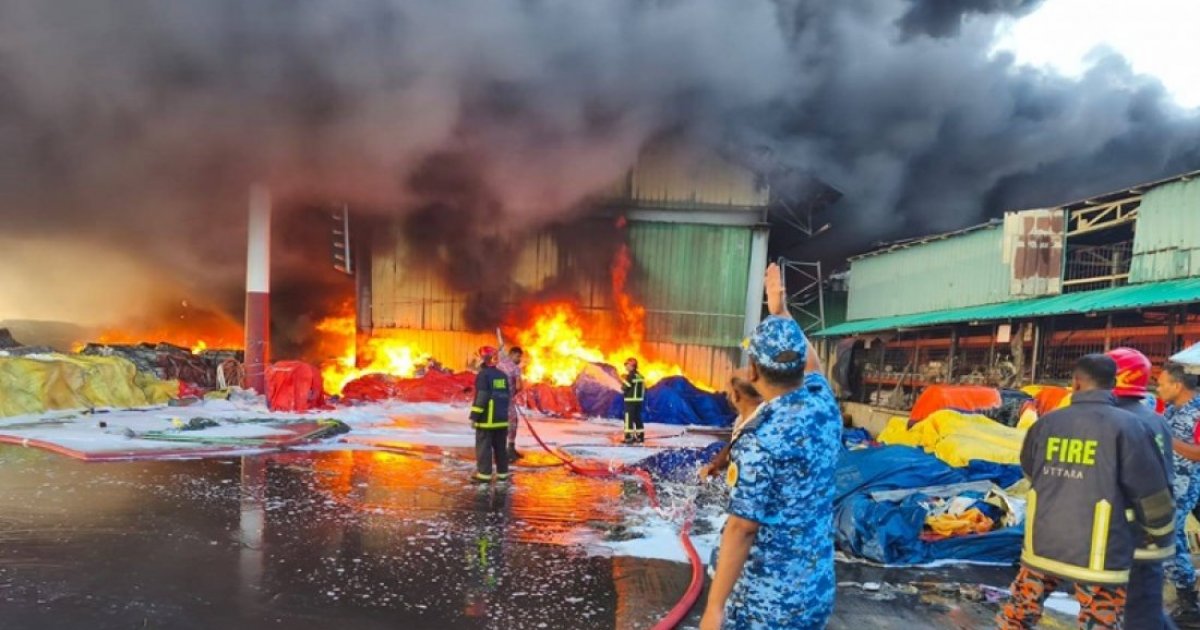The Exporters Association of Bangladesh (EAB) on Monday said the fire at the cargo village of Hazrat Shahjalal International Airport (HSIA) has caused an initial estimated loss of $1 billion to the country’s export sector.
EAB President Mohammad Hatem disclosed the estimate at a press conference held at a city hotel on Monday.
He urged the government to ensure stricter security in key areas like cargo villages and export-import ports to guarantee timely shipment of goods and maintain buyer confidence.
Representatives from major export sectors, including Bangladesh Textile Mills Association (BTMA) President Shawkat Aziz Russell and Pharmaceutical and Medicine Industry Association Vice President Dr Mohammad Zakir Hossain, were present at the briefing.
Hatem strongly criticized the authorities, saying the incident points to a “total failure” to maintain an effective fire detection and protection system in such a critical facility.
He noted that the financial impact extends far beyond the goods destroyed in the blaze. “It is difficult to determine the total extent of the losses for exporters right now,” he said.
“There was direct damage as products were burnt, but that is not the only loss. A much greater loss has occurred because finished goods, which were supposed to be produced from the burnt raw materials, cannot be exported,” he added.
BTMA President Russell alleged that “a deep conspiracy” was at play to tarnish Bangladesh’s goodwill internationally after the country reached a tariff deal with the United States. “Political and geopolitical players are working behind the scenes to destabilize Bangladesh’s manufacturing and export sectors because of their failures in international trade,” he claimed.
He warned that the disruption would severely hamper import-export activities in the coming days, risking the loss of market share, buyer confidence, and international trade agreements.
Hatem stressed the need for a full and transparent investigation to determine the accurate figure of the losses. Based on preliminary reports from members, he said the association believes the overall loss will be around $1 billion.
Also serving as the president of BKMEA, Hatem highlighted the wide array of essential goods handled at the cargo village, saying its security is vital for the national economy.
Exporters in the readymade garment (RMG) industry rely on the facility for urgent air shipments of light machinery, spare parts, raw materials, accessories and product samples.
The pharmaceutical sector uses it for importing raw materials and exporting sensitive medicines.
Exporters of frozen food, agricultural produce, vegetables and fruits are also dependent on it.
Hatem said the products could be completely ruined if not shipped on time, as many are highly perishable. “International courier services also use the facility for handling vital documents and parcels,” he noted.
Expressing deep concern over the recurring fire incidents across Bangladesh, Hatem warned that the recent blaze at such an ultra-sensitive area could have a major negative impact on the country’s image.
“It is a serious concern that foreign buyers may become anxious about the security of Bangladesh’s export products upon hearing news of this fire, which could negatively affect the economy,” he cautioned.
He also questioned whether there would be accountability for the negligence, saying: “We believe it is urgent for the government to launch an immediate, transparent, and effective investigation to find the answers to these questions.”
Hatem pointed to a recent series of fires in Ashulia, Mirpur, Chittagong EPZ and Incepta Pharmaceuticals as causes of “deep concern and insecurity” among business entrepreneurs.



